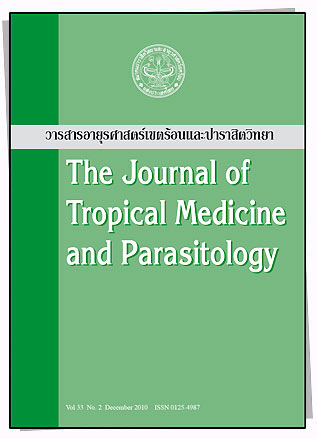Larvicidal Effect of Trypsin Modulating Oostatic Factor (TMOF) Formulations on Aedes aegypti Larvae in the Laboratory
Main Article Content
Abstract
Abstract
Trypsin Modulating Oostatic factor (TMOF), a peptide hormone originally isolated from theovaries of adult Aedes aegypti, is currently under commercial development as a new insecticide.This study was carried out to evaluate the various formulations of TMOF viz recombinant TMOFyeast cell paste form, TMOF yeast cell dried powder form, a combination of TMOF and Bti rice husk,TMOF and Bti wettable powder and TMOF and Bti mosquito fudge cubes formulated against Aedesaegypti larvae in the laboratory. The TMOF yeast cell paste and dried powder were found to cuasemortality in larvae from 24 hours exposure to 96 hours exposure. These products had a prolongedresidual effect for four weeks of observation. The TMOF and dried yeast powder (Pichia 11 and 12)caused 100% larval mortality after 96 hours of treatment. The TMOF and Bti in rice husk, wettablepowder and mosquito fudge cubes were effective in causing mortality within 1 hour of treatmentand gave a prolonged residual effect (no larva survived) against all larval stages for four weeks aftertreatment. The mosquito fudge cubes showed high larvicidal activity for three months after treatment.The TMOF and yeast cell and TMOF and Bti formulations have the potential to be utilized for denguevector control.
Keywords: Trypsin Modulating Oostatic Factor (TMOF) formulations, Bacillus thuringiensis (Bti), vectorcontrol, Aedes aegypti

